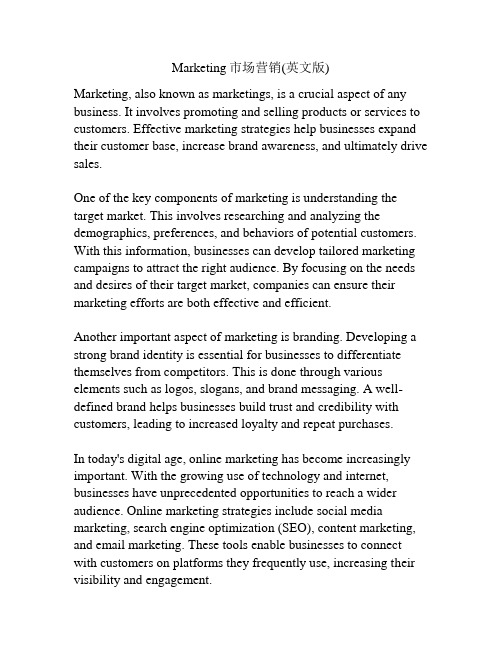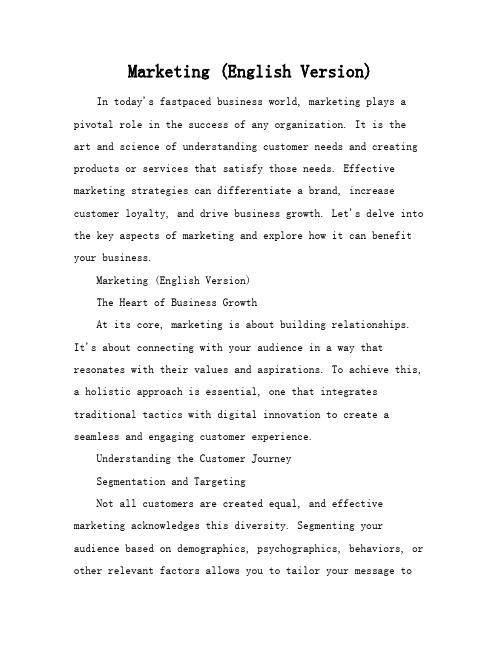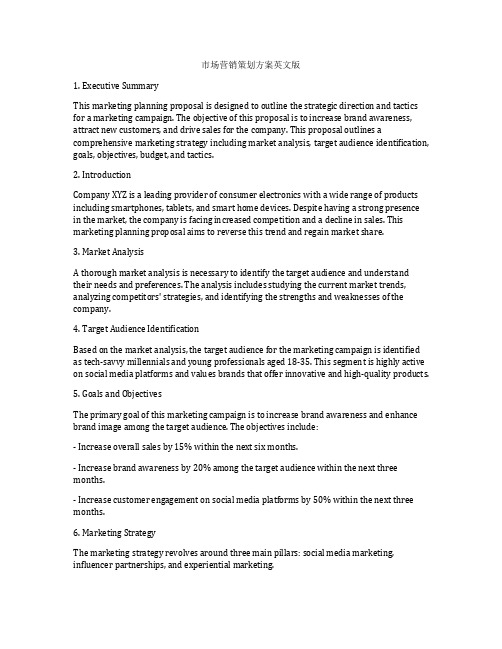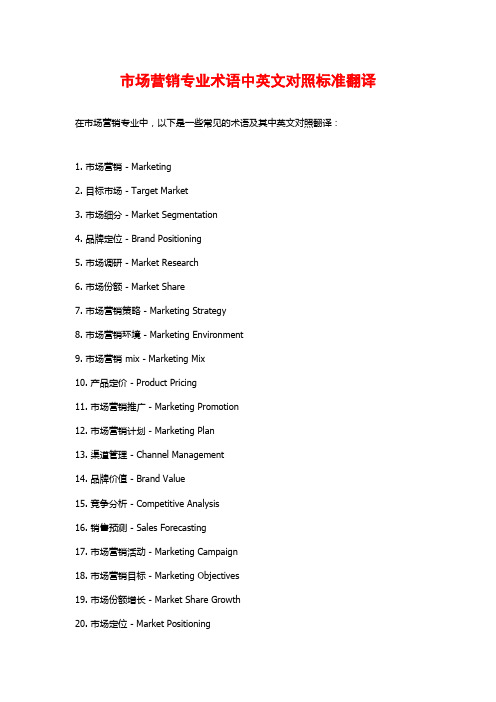市场营销 英文版
科特勒市场营销讲义英文版课件

Data Driven Decision Making: The availability of big data has enabled businesses to make data driven decisions in marketing By analyzing customer data, businesses can understand consumer preferences and behaviors and customize their offers accordingly
Competitiveness
Marketing helps businesses differentiate their products and services from those of their competitors It enables them to establish a unique position in the market and attract customers
Innovators
These consumers are early adopters of new products and services and are attracted to novelty and uniqueness They are often open to trying new brands or products and are willing to pay higher prices for the latest trends
Consumer decision making process
Evaluation of alternatives
Once information is gathered, consumers evaluate different product or service options to determine which one best suits their needs and budget Consumers consider factors like price, quality, functionality, and brand reporting
市场营销学英文版第13版

市场营销学英文版第13版Here is an English essay on the topic "Marketing, 13th Edition":Marketing is a multifaceted discipline that encompasses a wide range of strategies and techniques aimed at understanding consumer behavior, creating and delivering value, and ultimately driving business success. The 13th edition of the renowned Marketing textbook delves deep into the evolving landscape of marketing, equipping students and professionals with the knowledge and tools necessary to navigate the increasingly complex and dynamic market environment.At its core, marketing is about identifying and satisfying customer needs and wants. The 13th edition of the Marketing textbook provides a comprehensive overview of the fundamental principles and practices that underpin effective marketing strategies. It explores the process of market segmentation, target market selection, and positioning, empowering readers to develop tailored approaches that resonate with their target audience.One of the key aspects highlighted in this edition is the importance of understanding consumer behavior. The textbook delves into thepsychological, social, and cultural factors that influence consumer decision-making, enabling marketers to craft more personalized and compelling value propositions. By delving into consumer insights, the 13th edition equips readers with the ability to anticipate and respond to evolving consumer needs and preferences.Another crucial component covered in the 13th edition is the integration of digital technologies in marketing. In an increasingly connected world, the textbook examines the impact of digital channels, social media, and e-commerce on marketing strategies. It provides valuable insights into leveraging these digital tools to enhance customer engagement, improve brand visibility, and drive sales.The 13th edition also places a strong emphasis on the role of strategic marketing planning. It guides readers through the process of developing comprehensive marketing plans that align with an organization's overall business objectives. From conducting market analysis to formulating marketing mix decisions, the textbook equips readers with the skills needed to make data-driven, strategic marketing decisions.Furthermore, the 13th edition delves into the importance of ethical and socially responsible marketing practices. It explores the growing expectations of consumers and stakeholders for organizations toadopt sustainable and socially conscious approaches. By addressing these crucial considerations, the textbook prepares readers to navigate the complexities of the modern marketing landscape and contribute to the development of more responsible and impactful marketing strategies.Throughout the textbook, the 13th edition of Marketing seamlessly integrates case studies, industry examples, and real-world applications to bridge the gap between theory and practice. This approach allows readers to explore the practical implications of marketing concepts and apply their learnings to real-world scenarios.In conclusion, the 13th edition of the Marketing textbook is a comprehensive and invaluable resource for students, educators, and marketing professionals alike. It provides a robust foundation in the fundamental principles of marketing, while also addressing the evolving trends and emerging challenges in the field. By equipping readers with the knowledge and skills necessary to navigate the dynamic marketing landscape, this edition of the textbook empowers individuals to become strategic and adaptable marketing professionals, poised to drive success in the ever-changing business environment.。
Marketing市场营销(英文版)

Marketing市场营销(英文版)Marketing, also known as marketings, is a crucial aspect of any business. It involves promoting and selling products or services to customers. Effective marketing strategies help businesses expand their customer base, increase brand awareness, and ultimately drive sales.One of the key components of marketing is understanding the target market. This involves researching and analyzing the demographics, preferences, and behaviors of potential customers. With this information, businesses can develop tailored marketing campaigns to attract the right audience. By focusing on the needs and desires of their target market, companies can ensure their marketing efforts are both effective and efficient.Another important aspect of marketing is branding. Developing a strong brand identity is essential for businesses to differentiate themselves from competitors. This is done through various elements such as logos, slogans, and brand messaging. A well-defined brand helps businesses build trust and credibility with customers, leading to increased loyalty and repeat purchases.In today's digital age, online marketing has become increasingly important. With the growing use of technology and internet, businesses have unprecedented opportunities to reach a wider audience. Online marketing strategies include social media marketing, search engine optimization (SEO), content marketing, and email marketing. These tools enable businesses to connect with customers on platforms they frequently use, increasing their visibility and engagement.Another effective marketing technique is influencer marketing.This involves collaborating with influential individuals, such as celebrities or social media personalities, to promote products or services. By leveraging the popularity and credibility of these influencers, businesses can reach a larger audience and gain credibility and trust from their followers.Marketing also involves analyzing and measuring the effectiveness of marketing campaigns. This is done through metrics such as return on investment (ROI), customer acquisition cost (CAC), and customer lifetime value (CLTV). By tracking these metrics, businesses can evaluate the success of their marketing efforts and make any necessary adjustments to optimize their strategies.In conclusion, marketing plays a vital role in business success. It helps businesses understand their target market, build strong brands, and reach a wider audience through various channels. By implementing effective marketing strategies, businesses can increase their customer base, boost brand awareness, and ultimately drive sales.在一个竞争激烈的商业环境中,有效的营销策略是企业取得成功的关键。
市场营销(英文版)

Marketing (English Version) In today's fastpaced business world, marketing plays a pivotal role in the success of any organization. It is theart and science of understanding customer needs and creating products or services that satisfy those needs. Effective marketing strategies can differentiate a brand, increase customer loyalty, and drive business growth. Let's delve into the key aspects of marketing and explore how it can benefit your business.Marketing (English Version)The Heart of Business GrowthAt its core, marketing is about building relationships.It's about connecting with your audience in a way that resonates with their values and aspirations. To achieve this, a holistic approach is essential, one that integrates traditional tactics with digital innovation to create a seamless and engaging customer experience.Understanding the Customer JourneySegmentation and TargetingNot all customers are created equal, and effective marketing acknowledges this diversity. Segmenting your audience based on demographics, psychographics, behaviors, or other relevant factors allows you to tailor your message todifferent groups. This targeted approach ensures that your marketing efforts are more relevant and, consequently, more effective.The Power of StorytellingStories are a universal language that can evoke emotions and create lasting memories. In marketing, storytelling is a powerful tool that can humanize your brand and make it more relatable. By crafting narratives that align with yourbrand's values and mission, you can forge a deeper connection with your audience and inspire them to take action.Leveraging Digital ChannelsMeasuring SuccessMarketing is an investment, and like any investment, it needs to be measured for return. Key performance indicators (KPIs) such as conversion rates, customer acquisition costs, and customer lifetime value provide a clear picture of your marketing efforts' effectiveness. By analyzing these metrics, you can refine your strategies, optimize your budget, and ensure that your marketing activities contribute to your business's bottom line.Continuous ImprovementMarketing (English Version)The Art of Persuasion and EngagementThe essence of marketing lies in its ability to persuade and engage. It's not just about selling products; it's about selling an experience, a lifestyle, and a vision. Here's how businesses can harness the full potential of marketing to achieve their goals.Crafting a Compelling Brand IdentityInfluencing Consumer BehaviorUnderstanding the psychology behind consumer behavior is crucial for marketers. By identifying the triggers that lead to purchasing decisions, you can design campaigns that nudge potential customers towards conversion. This involves not only the rational aspects of product features and benefits but also the emotional appeal that can often be the deciding factor in a consumer's choice.The Role of Content MarketingContent marketing is the strategic creation and distribution of valuable, relevant, and consistent content to attract and retain a clearly defined audience. It's about educating your customers, entertaining them, and providing solutions to their problems. From blog posts to videos, infographics to podcasts, highquality content can establish your brand as an authority in your industry and build trust with your audience.Collaborating with InfluencersCustomer Engagement and Retention Ethical Marketing Practices。
市场营销策划方案英文版

市场营销策划方案英文版1. Executive SummaryThis marketing planning proposal is designed to outline the strategic direction and tactics for a marketing campaign. The objective of this proposal is to increase brand awareness, attract new customers, and drive sales for the company. This proposal outlines a comprehensive marketing strategy including market analysis, target audience identification, goals, objectives, budget, and tactics.2. IntroductionCompany XYZ is a leading provider of consumer electronics with a wide range of products including smartphones, tablets, and smart home devices. Despite having a strong presence in the market, the company is facing increased competition and a decline in sales. This marketing planning proposal aims to reverse this trend and regain market share.3. Market AnalysisA thorough market analysis is necessary to identify the target audience and understand their needs and preferences. The analysis includes studying the current market trends, analyzing competitors' strategies, and identifying the strengths and weaknesses of the company.4. Target Audience IdentificationBased on the market analysis, the target audience for the marketing campaign is identified as tech-savvy millennials and young professionals aged 18-35. This segment is highly active on social media platforms and values brands that offer innovative and high-quality products.5. Goals and ObjectivesThe primary goal of this marketing campaign is to increase brand awareness and enhance brand image among the target audience. The objectives include:- Increase overall sales by 15% within the next six months.- Increase brand awareness by 20% among the target audience within the next three months.- Increase customer engagement on social media platforms by 50% within the next three months.6. Marketing StrategyThe marketing strategy revolves around three main pillars: social media marketing, influencer partnerships, and experiential marketing.6.1 Social Media MarketingA comprehensive social media marketing plan will be executed to reach and engage with the target audience. This includes creating and optimizing social media profiles, developing a content calendar with relevant and engaging posts, and running targeted advertising campaigns.6.2 Influencer PartnershipsPartnering with influencers is an effective way to reach the target audience and gain credibility. Key opinion leaders in the consumer electronics industry will be identified and engaged to promote the company's products through sponsored content and product reviews.6.3 Experiential MarketingCreating immersive experiences for potential customers is crucial in showcasing the products' features and benefits. This can be achieved through pop-up stores, product launch events, and interactive demonstrations in high-traffic areas.7. Budget AllocationA detailed budget allocation plan is essential to ensure efficient spending of marketing resources. The budget will be divided as follows:- Social media marketing: 40%- Influencer partnerships: 25%- Experiential marketing: 20%- Miscellaneous expenses: 15%8. Measurement and EvaluationTo monitor the effectiveness of the marketing campaign, key performance indicators (KPIs) will be established. These include but are not limited to sales growth, website traffic, social media engagement, and customer feedback. Regular monitoring and analysis of these KPIs will guide future marketing decisions and help evaluate the campaign's success.9. ConclusionThis marketing planning proposal provides a comprehensive strategy for XYZ Company to improve brand awareness, attract new customers, and drive sales. By leveraging social media marketing, influencer partnerships, and experiential marketing, the company can successfully engage with the target audience and achieve its goals and objectives. With proper monitoring and evaluation, adjustments can be made to optimize the campaign and ensure long-term success.。
【市场营销英文版】08Market Segmentation and Targeting1

Market Segmentation
Markets can be huge and diverse entities made up of individuals. Since individual wants and needs tend to differ, trying to mass market to a whole market often is inefficient. Costing too much time and money, and hurting profit potential. Therefore, a company should focus or target specific groups or segments of individuals to enhance profit opportunities.
Market Targeting
Types of Targeting Decisions: • Single-segment concentration • Selective specialization • Product specialization • Market specialization • Full market coverage
Market Segmentation
Some will argue that mass marketing is better, because lower overall production costs are achieved. Lower expenses then leads to higher profits.
However, unless almost everyone is buying your product/service, the lower expenses will not necessary mean higher profits.
市场营销专业术语中英文对照标准翻译

市场营销专业术语中英文对照标准翻译在市场营销专业中,以下是一些常见的术语及其中英文对照翻译:
1. 市场营销 - Marketing
2. 目标市场 - Target Market
3. 市场细分 - Market Segmentation
4. 品牌定位 - Brand Positioning
5. 市场调研 - Market Research
6. 市场份额 - Market Share
7. 市场营销策略 - Marketing Strategy
8. 市场营销环境 - Marketing Environment
9. 市场营销 mix - Marketing Mix
10. 产品定价 - Product Pricing
11. 市场营销推广 - Marketing Promotion
12. 市场营销计划 - Marketing Plan
13. 渠道管理 - Channel Management
14. 品牌价值 - Brand Value
15. 竞争分析 - Competitive Analysis
16. 销售预测 - Sales Forecasting
17. 市场营销活动 - Marketing Campaign
18. 市场营销目标 - Marketing Objectives
19. 市场份额增长 - Market Share Growth
20. 市场定位 - Market Positioning
这些术语可以帮助您理解和沟通市场营销的概念和策略。
请注意,有时候术语的翻译可能存在一定的灵活性,具体使用时需要结合实际情境和语境进行理解。
市场营销专业英文介绍

市场营销专业英文介绍如下:Marketing is a major that explores the theories, concepts, and practices related to the promotion and sale of goods and services. It combines elements of psychology, sociology, and business to understand consumer behavior and market trends.The main focus of the marketing major is to provide students with a deep understanding of marketing concepts, strategies, and techniques. This includes an examination of buyer behavior, market research, product development, pricing, promotion, distribution, and sales.Students in this major also learn about marketing ethics and sustainability, as well as how to use digital tools and technologies to enhance marketing efforts. Additionally, they gain hands-on experience through internships, case studies, and other practical projects.The knowledge and skills gained through a marketing major can be applied in various industries, such as consumer goods, healthcare, technology, and non-profit organizations. Students who pursue this major often go on to become marketing managers, brand managers, product managers, or consultants in the private or public sector.总体来说,市场营销专业是一个综合性的学科,旨在培养学生在市场营销领域的理论知识和实践技能。
- 1、下载文档前请自行甄别文档内容的完整性,平台不提供额外的编辑、内容补充、找答案等附加服务。
- 2、"仅部分预览"的文档,不可在线预览部分如存在完整性等问题,可反馈申请退款(可完整预览的文档不适用该条件!)。
- 3、如文档侵犯您的权益,请联系客服反馈,我们会尽快为您处理(人工客服工作时间:9:00-18:30)。
Chapter one International marketing briefing 1.1 What is marketing 1.2 what is iternational marketing 1.3 international marketing of Chinese companies 1.4 marketing management orientations
2013/7/24 14
According to Maslow's hierarchy of needs, he divides human's needs into five levels: basic needs, safety needs, social needs, esteem needs and self-fulfillment needs. He usually uses a triangle or pyramid shape to describe his theory. ● Question: do the marketers create human needs?
●
needs, wants and demands product consumer value and consumer satisfaction exchange, transaction and relationships markets
2013/7/24
13
1 needs, wants and demands
18
2013/7/24
●
Demands: human wants that are backed by buying power.
When backed by buying power, wants beco/24
19
2 product
Marketing offer: some combination of products, services, information, or experiences offered to a market to satisfy a need or want. ● Many sellers make the mistake of paying more attention to the specific products they offer than to the benefits and experiences produced by these products. These sellers suffer from “marketing myopia”.
●
2013/7/24
8
●
Objectives (学习目标) ------Page 3
terms ------page 14
●Key
●Notes
------page 14-15
2013/7/24 9
1.1 What is marketing
1.1.1 The definition of marketing ① Page 3 ②Marketing: a social and managerial process by which individuals and groups obtain what they need and want through creating and exchanging value with others.
2013/7/24 16
●
●
●
Basic needs are relatively few, but people's wants are unlimited, they are shaped by social influences, their past history and consumption experiences. Different people, then, may have very different wants to satisfy the same need. Everyone needs to keep warm on cold winter nights, for instance. But some people want electric blankets, while others prefer oldfashion down comforters. Just because of this, it give room or scope to the marketer.
2013/7/24 2
Main Content
Part Ⅰ: International Marketing Basics Prat Ⅱ: The International Marketing Environment Part Ⅲ: Targeting International Markets Part Ⅳ: International Marketing Mix(4Ps) Part Ⅴ: Managing the International Marketing PartⅥ: E-commerce and Online Marketing
● ●
●
Need: states of felt deprivation. The most basic concept underlying marketing is that of human needs. Needs are the basic forces that drive customers to take action and engage in exchanges. We all have basic physical needs critical to our survival, such as food, drink, warmth, shelter, sleep and security. We also have social and individual needs critical to our psychological well-being, social need for belonging, love, esteem and individual needs for knowledge and self-fulfillment.
●
2013/7/24 22
4 exchange, transaction and relationships
Exchange: the act of obtaining a desired object from someone by offering something in return. ● Exchange is the core of marketing.
●
2013/7/24 15
●
Wants: the form human needs take as shaped by culture and individual personality.
A person wants particular products, brands and services to satisfy a need. A person is thirsty and wants a Coke. A person is tired and wants a vacation in Shanghai.
International Marketing
Huili Shang Associate Professor
Doctor
2013/7/24 1
Lectures design
1、2*15=30 2、Reference book: Marketing : An introduction Gary Armstrong(加里· 阿姆斯特朗) Philip Kotler(菲利普· 科特勒) 3、Communication: if you have any question, don not hesitate to let me know.
●
2013/7/24
23
These conditions must be met before an exchange occurs:-----five conditions
2013/7/24
3
人口经 济环境
营销 中介
技术自 然环境
产品
供应 商 分 销
目标 顾客
促销
价 格
公众
基 本 内 容
政治法 律环境
2013/7/24
竞争者
社会文 化环境
4
要注意区别的几个问题
角度问题
营销人员与销售人员
要注意的问题
宏观营销与微观营销
2013/7/24
5
营销人员与销售人员的区别
营销人员 销售人员
(1)Customer needs and wants (2)R&D (3)Engineering (4)Manufacturing (5)Customer value
2013/7/24
12
1.1.3 basic elements of the marketing concept---P 4
1 ● 2 ● 3 ● 4 ● 5
2013/7/24 17
●
A major part of a marketer's job is to develop a new product or service and then to stimulate customer wants for it by persuading people it can help them better satisfy one or more of their needs. For example, homeowners might buy a home security system to satisfy their need for personal safety.
